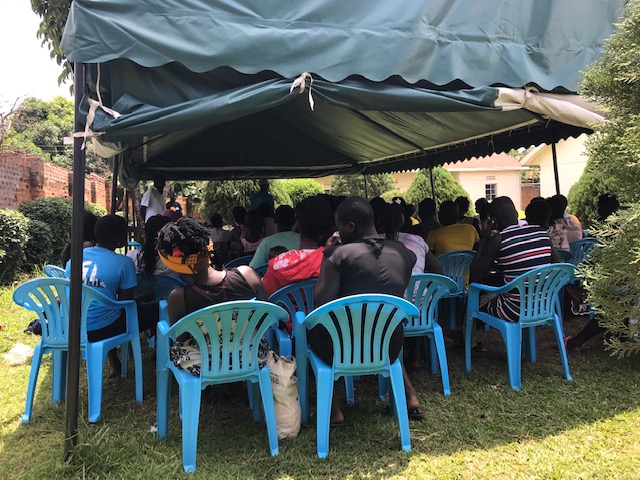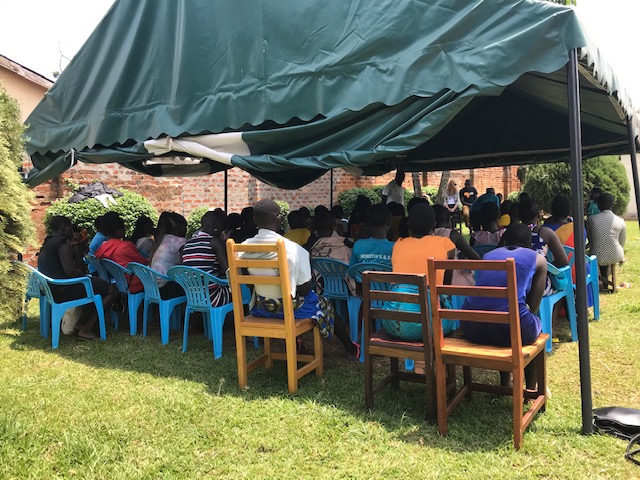I Live Again – Uganda (ILA) is a non-profit organisation birthed and based in the northern region of Uganda. Founded by Benson Ocen in the aftermath of the horrific war that ravaged the area in the 1980’s – 2006, it has four key strands that underpin all aspects of its work: trauma counselling, discipleship, resettlement and community development.
Initially the trauma counselling focussed on those individuals and communities that had been subjected to the most appalling acts of terror, and who desperately needed help in moving forwards. Community development was a natural adjunct to this, and resettlement was offered to those who had fled the area during the war but, having received counselling and started to move forward in life, were now keen to try and return to their homeland but were unable to gather the resources to do this unaided. As an organisation fully rooted in the Christian faith, the discipleship strand sits at the heart of all the programmes, supporting the participants in their faith-related journey of restoration and growth.
When I visited the ILA team in April this year, after a year’s absence due to CV-19, I was delighted to hear of, and see in action, a new programme that has been added to the work of ILA. It works with girls aged 17 years and under who, for various reasons, have become caught up in the sex-work industry in the town of Gulu.

For context, Gulu is the largest town in the northern region of Uganda and is on the main transport route to and from Sudan and South Sudan. It is the place that people from the villages might come to in search of work – either as final destination, or en route to Kampala and the real ‘bright lights’ of Uganda’s capital city.
Reasons for getting caught up in the sex industry tend to ultimately be down to desperation for money – either because the girls are from impoverished backgrounds and have come to town in search of work, or because they have fled from abusive and dysfunctional family backgrounds. Some of the girls have come to Gulu out of their own volition, others have been trafficked.
Whatever the back story to the girl being on the streets, the outcome is largely the same – traumatised, brokenness, hopelessness and a deep distrust of others, except those girls with whom they have formed ‘family’ in order to survive.
So, that’s the background to why the ILA programme is needed, and why it got set up 6 months ago – to bring healing and hope to the girls, to provide them with counselling, discipleship, and training in new forms of income generation. They are also offered the opportunity to return home, if that is appropriate, so the ILA focus of resettlement is always there, and underpinning the programme is the recognition that by helping these vulnerable community members, the community itself is being developed.
The girls attend the programme in groups of about 20 – so that there is capacity to really give the one-on-one support that they need, especially early on. The first stage of the programme is the counselling and discipleship element, with ongoing mentoring – to move the girls towards healing and feeling able to trust others again. Then, when they are ready, they are given the opportunity to train in a new skill – maybe tailoring or hair and beauty. Alongside this they get business development training, so that they have the knowledge base needed to set themselves up in business at the end of the course.

The programme takes place in the ILA compound, and this place becomes the girls’ safe space – a place where they don’t need to fight for food, where they receive non-judgmental, unconditional love and support, where they access clothes if needed, or help with health care, where they can just relax and be girls – chatting, giggling, being young teenagers again.
Because that is what they are – young teenagers who should not have experienced the massive amounts of trauma, degradation and lack of self-worth that they have suffered in their short lives.
ILA’s programme is still in its early days, but the testimonies of transformation, renewed hope, and positivity that come from the girls are powerful to hear. Long may they last, and long may the programme reach out to bring healing to the many hurting girls who find their way to the doors of ILA.




